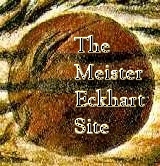|
|
||
 |
Meister Eckhart Home / Works by Meister Eckhart - Quotes / Inspired by Eckhart / Studies / The Papal Condemnation / Mail & Announcements / Links / Books |
AMY HOLLYWOOD
From: M. Rubin, W. Simons (ed.), The Cambridge History of Christianity, v. 4, Christianity in Western Europe, c. 1100 - c. 1500, Cambridge 2009 (Pages 297-307).
Page 7
Eckhart's Latin works provide the ontological framework for his claims there and in his German sermons and treatises that human beings, insofar as they are created, are absolutely other than the Godhead, but, insofar as they are uncreated, are one with the divine ground. Eckhart's German sermons, in particular, call on his listeners to engage in a process of detachment from all creatureliness – most centrally the operations of the intellect and the will – in order to be one with the Godhead without distinction. While others debate whether knowledge or love – the intellect or the will – provide the best means to attain union with God (and hence the substance of the beatific vision), [11] Eckhart insists that the truly just human being detaches from both, insofar as they are created, in order to give birth to justice, who is the Son himself: The Father gives birth to his Son without ceasing; and I say more; he gives me birth, me, his Son and the same Son. I say more: he gives birth not only to me, his Son, but he gives birth to me as himself and himself as me and to me as his being and nature. In the innermost source, there I spring out in the Holy Spirit, where there is one life and one being and one work. Everything God performs is one; therefore he gives me, his Son, birth without any distinction. [12]
Eckhart claims Augustinian warrants for his understanding of the union between the ground of the soul and the ground of the divine, yet it is unlikely that Augustine would have been comfortable with Eckhart's claims concerning the soul's ability fully to transcend its created nature. (Certainly his inquisitors were not, although in large part because of their inability to acknowledge Eckhart's distinction between former and virtual creation.) [13]
[11] On these debates, see Bernard McGinn, 'Love, Knowledge and Unio Mystica in the Western Christian Tradition', in Moshe Idel and Bernard McGinn, eds., Mystical Union in Judaism, Christianity, and Islam: An Ecumenical Dialogue (New York: Continuum, 1996), 59–86; Bernard McGinn, The Presence of God, vol. 2, The Growth of Mysticism: Gregory the Great through the Twelfth Century (New York: Crossroad, 1994), 200–3 and 233–74; and McGinn, The Flowering of Mysticism, 78–87, 110–12, and 135–6.
[12] Eckhart, Essential Sermons, German Sermon 6, 186–7. Translation slightly modified.
[13] On the issue of Eckhart's condemnation, see Bernard McGinn, 'Eckhart's Condemnation Reconsidered', The Thomist 44 (1980), 390–414; and Bernard McGinn, The Mystical Thought of Meister Eckhart: The Man from Whom God Hid Nothing (New York: Herder and Herder, 2001), 14–19.